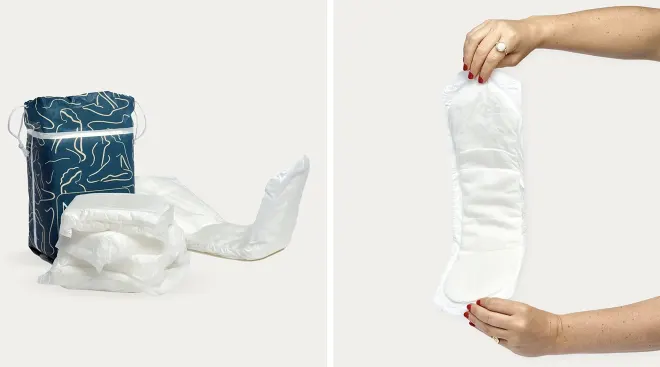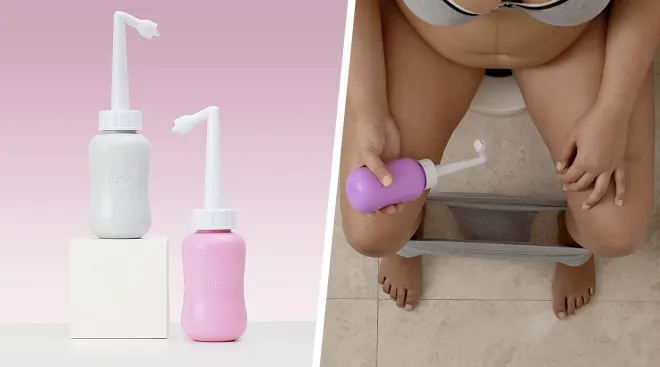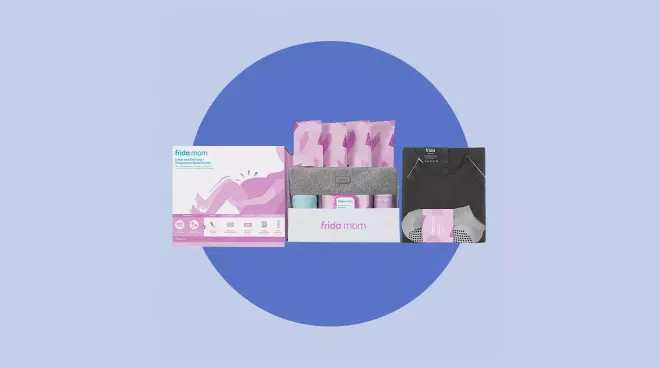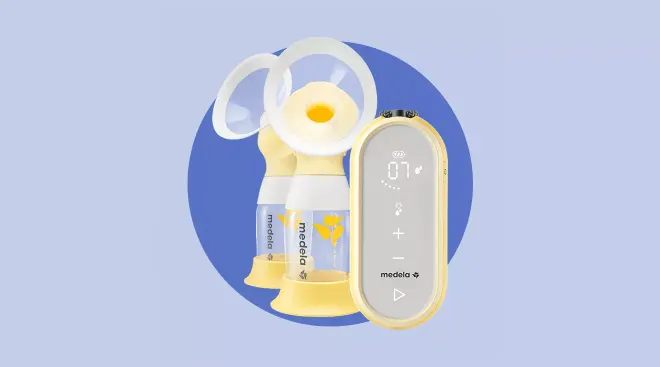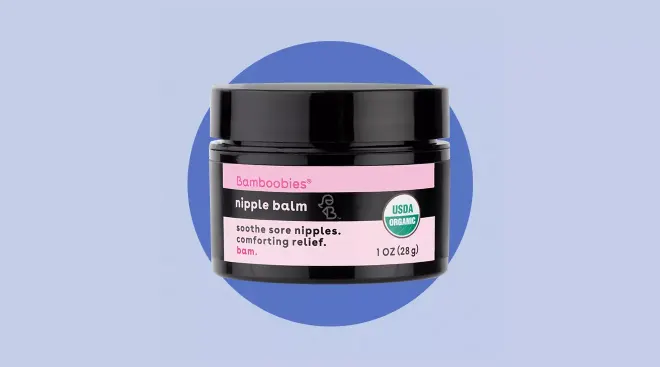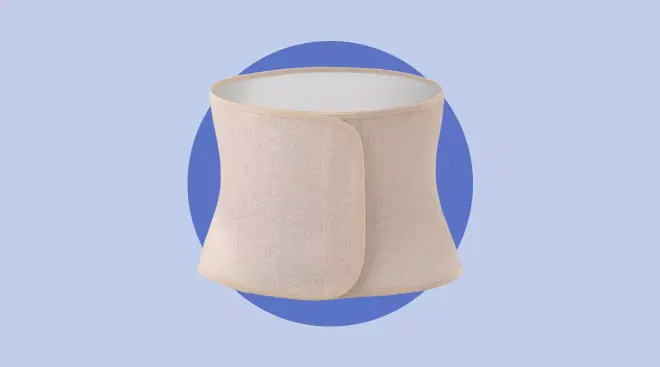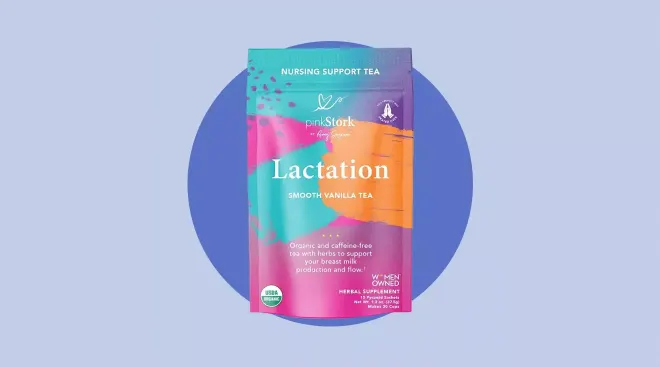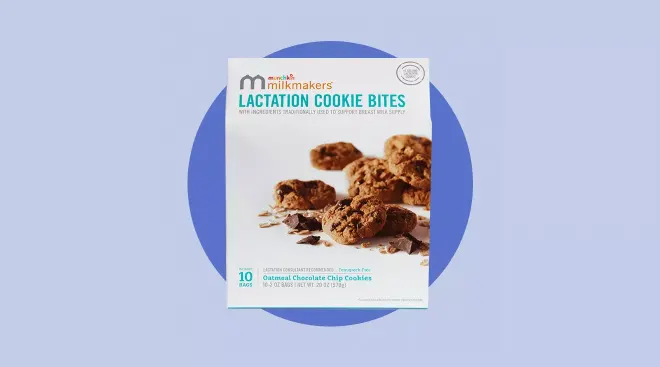The 6 Best Postnatal Vitamins, Tested by a Postpartum Mom
In a nutshell:
Based on first-hand product testing and expert advice, we chose Theralogix TheraNatal Lactation Complete as the overall best postpartum vitamin. This choice stood out not only for its comprehensive range of essential nutrients, but for the high levels of vitamin D that offer an alternative to supplemental vitamin D drops.
It’s no surprise pregnancy and birth can drain you. By the time postpartum comes around, you’re likely running on fumes. And between getting zero sleep and endless diaper changes, eating healthy often gets pushed to the back burner. “It can be difficult to consume enough recommended vitamins and minerals through diet alone, especially if nauseated or quite busy in the postnatal period,” explains Maria Silver Pyanov, CPD, a certified postpartum doula and childbirth educator in Philadelphia.
With my first baby, I skipped postnatal vitamins entirely. But this time around, in the weeks after giving birth to my second child, I’ve been making a point to take them daily. And let me tell you, the difference is night and day. While postnatal vitamins can’t totally replace a healthy diet with real foods, they’re a lifesaver on those hectic days when nourishing my body feels impossible. But here’s the thing: not all postnatal vitamins are created equal. Some don’t even meet the postpartum nutritional requirements set by medical experts. So, finding the right one can be a bit tough. To help make your search for the best postnatal vitamins easier, I put nine vitamins to the test one week after giving birth and found six that truly deliver. Keep reading for my top picks and expert advice on what to look for in high-quality postnatal vitamins.
The Bump editors conducted extensive research to identify six top-rated postnatal vitamins on the market, and from there, we did the following:
- After giving birth to my second child, I tested nine postnatal vitamins in my first two weeks postpartum. I tested each vitamin while caring for my newborn in those early days. Then, I reviewed and scored each one based on its ingredients, ease of taking, flavor, quality and value for money.
- We interviewed an ob-gyn, a postpartum doula and a nutritional biochemist to understand the essential ingredients needed during postpartum and things you should keep in mind as you shop for your own postnatal vitamins.
- Because no two moms are the same, we scoured forums, message boards and user reviews to see how these vitamins performed for a wide range of new parents.
Editorial integrity is at the heart of everything we publish. Read about how The Bump develops and reviews all articles, including product reviews.
Overall best postnatal vitamin
- Hits all key nutrient requirements
- Provides and alternative to baby vitamin D supplementation
- One pack contains a 3-month supply
- High up-front cost
- Three daily pills
TheraNatal Lactation Complete postnatal vitamins are a definite winner. Their nourishing formulation—which includes all key nutrients recommended by our experts—scored high across all testing categories. And on top of hitting all the marks for postpartum essentials, these mighty vitamins are the first on the market to provide 6,400 international units (IU) of vitamin D3 per day. According to Theralogix’s experts (and backed by research) this provides an alternative to supplemental vitamin D drops for breastfed babies. This completely won me over because, let’s be real, remembering to give baby their vitamin D drops each day is a real struggle.
The daily line-up includes two standard pills and one softgel. Honestly, at first, I was a little bummed I had to take three pills compared to just one. But when I popped them in my mouth and took a drink of water, they all sort of clumped together nicely and went down super smooth with no aftertaste. I will note that this brand only gives you the option of buying a 13-week supply, which makes their initial price of $90 a significant upfront cost. However diving deeper, it equals out to about a dollar a day, which is pretty standard for postnatal vitamins, about in the middle price range of the options we tested. For me, the quality of ingredients you get for the price you pay made these a no-brainer to support myself and my baby.
Number of servings: 91 | Serving size: 2 tablets and 1 softgel | Key nutrients: Calcium, choline, folate, iodine, iron, vitamin D, omega-3 (DHA)
Our product tester says:
“I would recommend these to other women due to their full scope of key nutrients compared to other brands on the market… this is the only brand [I tested] that contains all the recommended key nutrients and minerals.”
Best budget-friendly postnatal vitamin
- Low price point
- Two-month supply
- Hits most RDI-level markers
- Has a couple non-nutrient additives
- Includes GMOs
I don’t think there’s another postnatal on the market that’s more affordable than NatureMade’s Postnatal Multivitamin while still providing the same quality benefits. These vitamins meet the recommended daily intake of most of the essential postpartum nutrients our experts suggest. Zooming in on folate specifically, these vitamins have one of the highest microgram amounts compared to competitors, which Sarah Jordan, MD, a board-certified ob-gyn and medical director at Pediatrix Medical Group in Fort Worth, Texas, says is a very important component in a postnatal vitamin. Add in the fact that you get a total of 60 pills lasting two months, that’s only about 50 cents a day for your postnatal vitamin needs—the lowest cost of any option we tested.
Parents love that you only need to take just one pill per day (and so do I!). The one capsule was very easy to swallow, even though it’s on the medium-to-larger side. They do have a very slight fishy smell when first opening the bottle, thanks to the beneficial omega-3s. But when taking one, I got an initial sweet taste before swallowing it down, so I didn’t mind it at all. Bottom line, these vitamins are much higher quality than the price suggests.
Number of servings: 60 | Serving size: 1 softgel | Key nutrients: Calcium, folate, iodine, iron, vitamin D, omega-3 (DHA)
Our product tester says:
“I don’t think there’s another postnatal that is cheaper and provides the same benefits.”
Best postnatal vitamin for lactation support
- Includes galactagogues for breastfeeding support
- Contains no GMOs, soy or gluten
- No DHA
- You need to take 3 per day
The impressive milk-boosting aspect of Naturelo postnatal vitamins is something to talk about. Their formulation includes galactagogues like fenugreek, thistle, fennel extract, nettle and alfalfa—substances that have been shown to help boost breast milk supply. That said, the evidence on whether these herbs truly increase milk supply is a bit unclear as results from scientific studies are mixed. Some studies show that herbs like fenugreek increase breast milk production, while others showed little evidence. Barrett's expert advice? “If you’re considering supplements with galactagogues, talk to your healthcare provider to make sure they’re the right choice for you and your baby.”
No other vitamins we tested included these milk-boosting ingredients, but as a breastfeeding mom myself, I appreciate anything that can help increase supply. I also love the fact that these vitamins have very minimal additives: no preservatives, no flavorings, nothing. With many parents (including me) prioritizing clean products, these are for sure a hit. You also won’t find any GMOs, soy or gluten in Naturelo’s postnatal vitamins either. The one thing I will note is that these vitamins do not include DHA–an essential nutrient Jordan says passes through breastmilk and plays a key role in baby’s brain and eye development. So if you decide to purchase this brand, make sure you’re also getting enough DHA through other sources in your diet each day.
Number of servings: 60 | Serving size: 3 capsules | Key nutrients: Calcium, choline, folate, iodine, iron, vitamin D
Our product tester says:
“I really love the breastfeeding herb support in this postnatal. Many moms struggle with supply and this is a great aid.”
Easiest-to-swallow postnatal vitamin
- Small capsules
- Vegan and gluten-free
- Can be taken on an empty stomach
- Strong flavor
- No calcium included
Anything that makes postpartum life simple and effortless gets major points in my book. These vitamins accomplish just that. You can take Ritual’s Postnatal Multivitamins with or without food—perfect for busy moms. And the fact that these capsules are small and have a smooth outside coating makes them that much easier to swallow. The coolest thing about them, though, is their double delayed-release design. Each pill has an additional capsule floating inside of it, full of all the goodie vitamins and minerals. This intentional design helps curb nausea if you take your vitamins on an empty stomach—which really isn’t out of the question because you’re often busy feeding baby in one hand and rushing to get ready for the day with the other.
And did I mention its clean ingredients? With no sugars or artificial colors, the non-vitamin ingredients are pretty slim. They’re also gluten-free and vegan. The one thing I will say is that it’s a bummer these vitamins don’t include calcium. But I appreciate that Ritual states they focus on calcium-helper nutrients like vitamin D3, vitamin K2, magnesium and boron instead. I personally thought it was great they are transparent and explain this on their website.
Before you buy these postnatal vitamins, know this: these have a very minty flavor to them, and it might surprise you. The peppermint flavor even tingled my tongue. I will say though, it did give me a nice fresh breath feeling for the aftertaste, which could be a potential bonus—I really didn’t mind it at all. If you don’t like minty flavors, Rital does offer this postnatal in a citrus flavor, too. But if you have a sensitive palette, you might want to opt for a different brand.
Bonus: Get 25 percent off your first month with the exclusive code BUMP2528.
Number of servings: 30 | Serving size: 2 capsules | Key ingredients: Choline, folate, iodine, iron, vitamin D, omega-3 (DHA)
Our product tester says:
“It went down very smooth and was overall easy to swallow.”
Best postnatal vitamin for higher choline
- Includes whole-food ingredients
- Easier digestion
- Contains 36% of your daily choline value
- Lacks calcium and DHA
- Larger-sized pills
Choline is an essential nutrient passed through breast milk. And getting enough of it directly affects baby’s brain development by supporting cell formation, producing neurotransmitters and increasing cognitive function, explains Barrett. “Breastfeeding mothers should aim for 550 milligrams of choline daily,” she adds. MegaFood Baby & Me 2 Postnatal Multi contained the highest level of choline out of any option tested, giving moms 36 percent of their daily choline value.
I also like that this brand focuses on extracting its ingredients from whole-food sources rather than relying on synthetic vitamins and minerals. This a big plus for me, since studies show natural whole foods are nutritionally superior to synthetics. The real kicker here is the additional real food blend of oranges, carrots, cabbage and broccoli. Simply put, no other postnatal vitamins prioritize nutrients from real foods as this brand does. You take two pills—not as easy as one, but not the worst I tested—and the flavor was slightly herby, in a pleasant way, with no aftertaste.
These vitamins also earned just about a perfect score in the packaging department. They come in a nice, dense glass bottle, further enhancing the quality feeling you get when taking them, and they shipped my vitamins without excessive plastic packaging—just a simple cardboard box with paper padding inside. Compared to all the wasteful plastic packaging you usually get from competitor brands, this one was a nice relief—planet Earth and I thank you!
Number of servings: 30 | Serving size: 2 tablets | Key ingredients: Choline, folate, iodine, iron, vitamin D
Our product tester says:
“I love that these are non-GMO and include a food blend of oranges, carrots, cabbage, and broccoli. The moringa leaf is an added benefit for people breastfeeding as well as the extra choline provided compared to other brands.”
Best postnatal vitamin for higher iron
- Has 56% of your daily iron value
- Additional mood-supporting blend
- Stress relief powered by ashwagandha
- Doesn’t include calcium
- Five daily pills can be excessive for some
Perelel’s Mom Multi Support Pack has the highest amount of iron compared to any other vitamin we tested. Jordan tells us that postpartum moms should try and get at least 27 milligrams of iron daily—thankfully, these vitamins give you more than half of this daily value in just one dose. It’s not that uncommon for moms to be anemic in the postpartum period following blood loss from birth. Your body goes through a lot during this time. But as Jordan tells us, “iron in postnatal vitamins can prevent anemia and help with postpartum recovery,”
Here’s something else that blew me away about this postnatal vitamin: It’s not just a multivitamin. You get additional pills in your daily pack that supports your mood, heart and brain health, beauty (hair, skin and nails) and a stress balancer filled with antioxidants and ashwagandha to help improve your mood. These five vitamins work together to give you a holistic 360-degree postpartum recovery experience. And before you cringe at taking five pills daily, it really helps that these are smaller and portioned out into individual daily packets. That means they are already grouped and ready to take without you thinking about them too much.
My favorite part is that these postnatal vitamins come with a scannable QR code telling you more about each of the five vitamins, what they do and how to take them—that was super valuable, in my opinion! With so much going on in this package, it’s great that they provided an additional resource for understanding their product.
Number of servings: 30 | Serving size: 4 capsules and 1 softgel | Key nutrients: Choline, folate, iodine, iron, vitamin D, omega-3 (DHA)
Our product tester says:
“Seems like high quality ingredients and they are 3rd party tested which gives them another boost. This brand used way fewer non-vitamin ingredients than others.”
Postnatal Vitamins Comparison Chart
| Overall best postnatal vitamin | Best budget-friendly postnatal vitamin | Best postnatal vitamin for lactation support | Easiest-to-swallow postnatal vitamin | Best postnatal vitamin for higher choline | Best postnatal vitamin for higher iron | |
|---|---|---|---|---|---|---|
Overall Best 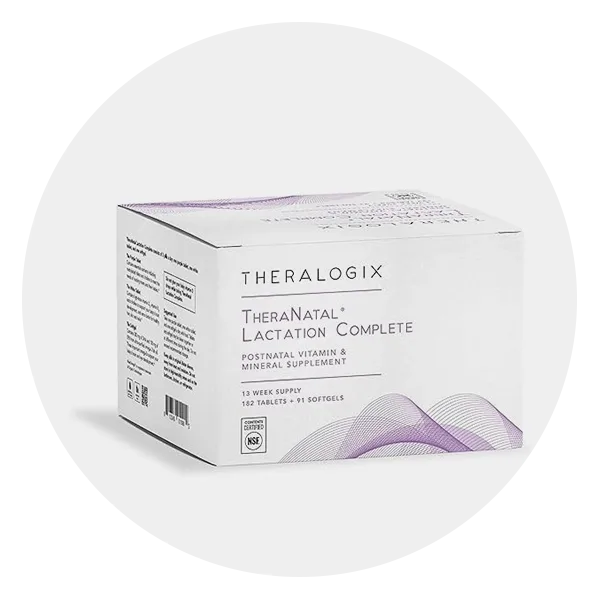 Theralogix TheraNatal Lactation Complete | 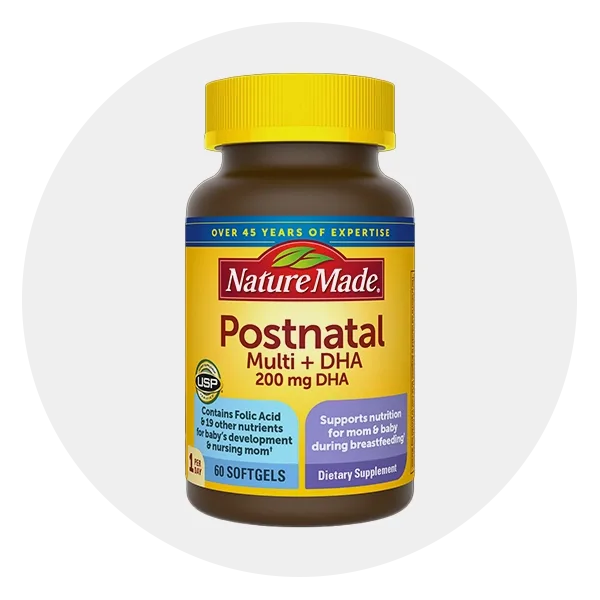 NatureMade Postnatal Multivitamin + DHA | 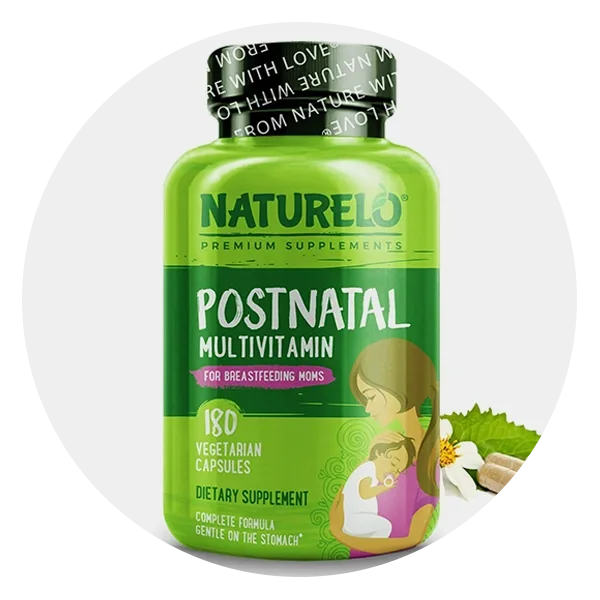 Naturelo Postnatal Multivitamin for Breastfeeding Moms | 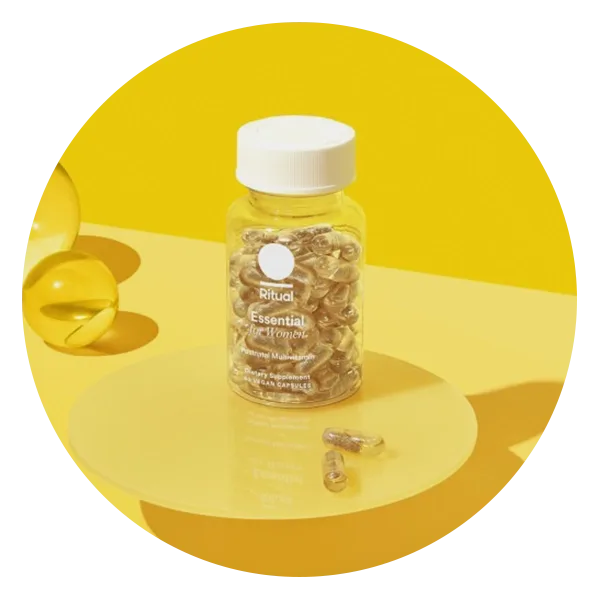 Ritual Essential for Women Postnatal Multivitamin | 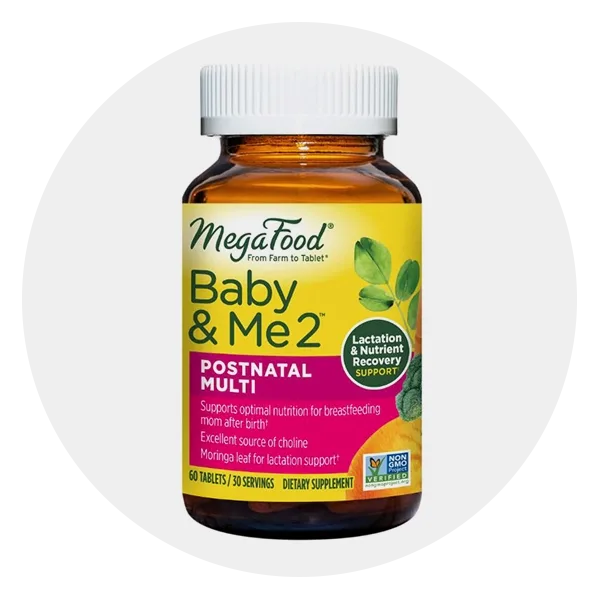 MegaFood Baby & Me 2 Postnatal Multi | 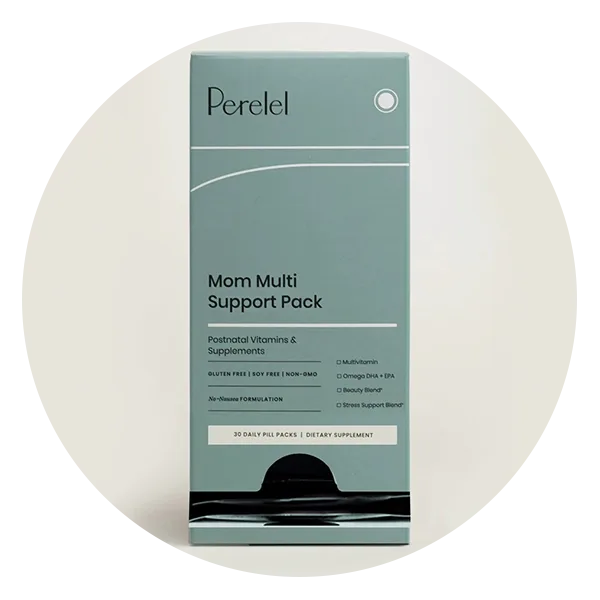 Perelel Mom Multi Support Pack | |
| Price | $$ | $ | $ | $$$ | $$ | $$$ |
| Number of servings | 91 | 60 | 60 | 30 | 30 | 30 |
| Serving size | 2 tablets and 1 softgel | 1 softgel | 3 capsules | 2 capsules | 2 tablets | 4 capsules and 1 softgel |
| Vegan | ||||||
| Non-GMO | ||||||
| Subscription available | ||||||
| Buy NowRead Full Review | Buy NowRead Full Review | Buy NowRead Full Review | Buy NowRead Full Review | Buy NowRead Full Review | Buy NowRead Full Review |
According to Jordan, postnatal vitamins are not an absolute need, especially if you’re getting the recommended vitamins, minerals and nutrients in your diet. That said, many women find meeting all these nutritional requirements daily can be tricky. “In that case, a postnatal vitamin is a great tool to aid you in reaching these goals,” Jordan adds. Including that extra protection during those early months after birth can help ensure optimal recovery.
If you’re breastfeeding, taking a postnatal vitamin may be even more beneficial for you. Erin Barrett, PhD, a nutritional biochemist and director of product innovation and scientific affairs at Shaklee, explains that breastfeeding puts even more nutritional demands on top of everything. “Your baby depends on you for essential nutrients that may be harder to get from diet alone,” she points out. Think of a postnatal vitamin as an overall safety net for the days life gets busy—which isn’t uncommon postpartum.
How long should you take postnatal vitamins for?
If you end up adding a postnatal vitamin to your daily lineup, Jordan recommends continuing to take them for at least six months postpartum. But there’s really no strict timeline—do what makes you feel the best. If you’re breastfeeding, Jordan also suggests continuing your postnatal until your baby has weaned off breastmilk.
The biggest difference between prenatal and postnatal vitamins is their nutrient levels. According to Barrett, most prenatal vitamins have higher amounts of folate and iron, which specifically help prevent neural tube defects and support increased blood volume during pregnancy. And on the other hand, many postnatal formulas contain more omega-3s to support mom’s mood and help with baby’s brain development—especially if mom is breastfeeding.
“That said, I think it’s totally fine for women to continue taking prenatal vitamins after giving birth,” adds Barrett. No need to waste that extra stash if you have one.
“After childbirth, your body needs specific nutrients to recover and support overall health,” says Barret. She says your body needs iron, iodine, vitamin D, omega-3 fatty acids, choline, folic acid and calcium to recover and support postpartum health. And remember, you’re not only supporting yourself with these key nutrients—if you’re breastfeeding, baby will get these essentials, too.
- Iron. The World Health Organization (WHO) notes that women who take an iron supplement in the first 6 to 12 weeks after birth significantly reduce the risk of anemia. Essentially, this powerful mineral swoops in and replenishes the body’s blood supply after pregnancy and delivery. However, it’s important to note that some forms of iron, like ferrous sulfate, are much more likely to cause constipation. And for many postpartum moms, this can be an issue. If you’re worried about it, Barrett suggests finding a postnatal vitamin with iron in the form of ferrous bisglycinate, which can be a gentler option.
- Iodine. This mineral plays a key role in supporting baby through breast milk. According to the US Centers for Disease Control and Prevention (CDC), if a breastfeeding woman isn’t getting enough iodine, baby may be at risk for cognitive impairments. That’s why it’s crucial for breastfeeding women to get 150 micrograms of iodine daily.
- Vitamin D. Your immune system, bones and teeth all depend on vitamin D. For breastfeeding moms, vitamin D is crucial since breast milk alone may not contain enough to share with baby, says Barrett. The AAP recommends getting at least 400 IU daily.
- Omega-3 fatty acids. Especially in the form of DHA and EPA, omega-3s play a key role in heart health and enhancing your mood. In fact, studies show that supplementation with omega-3 fatty acids rich in EPA can reduce symptoms associated with postpartum depression.
- Choline. This essential nutrient supports your brain health as well as baby’s brain and nervous system development. Not only that, but experts suggest choline helps reduce mood swings, lower blood pressure, boost memory and reduce cholesterol. The recommended amount for postpartum and lactating women is between 425 and 550 milligrams daily.
- Folic acid. This B vitamin plays a role in helping your body heal and regenerate tissues after childbirth. This is very important for postpartum recovery as your body has an open wound the size of a dinner plate from the placenta. Experts recommend taking 400 micrograms daily, whether postpartum or pregnant, for optimal cell regeneration.
- Calcium. Originally found in dairy and leafy greens, calcium is key for keeping bones and teeth strong–both for you and your baby. Here’s something you might not know: some calcium is taken from the mother’s bones while breastfeeding for baby, which is why getting 1,000 milligrams of calcium daily is crucial.
About the writer:
Dani Wolfe is a senior marketer and women’s health writer who is newly postpartum with her second child. After first becoming a mom in 2021, she craved advocacy in this space and strives to help other women feel supported through her work. She has a bachelor’s degree in science and a certification in holistic nutrition. Dani lives on Lake Michigan with her husband, 3-year-old daughter and newborn baby boy.
Please note: The Bump and the materials and information it contains are not intended to, and do not constitute, medical or other health advice or diagnosis and should not be used as such. You should always consult with a qualified physician or health professional about your specific circumstances.
Plus, more from The Bump:
Erin Barrett, PhD, is a nutritional biochemist and director of product innovation and scientific affairs at Shaklee. She earned her degree from The University of North Carolina at Chapel Hill.
Sarah Jordan, MD, is a board-certified ob-gyn and medical director at Pediatrix Medical Group in Fort Worth, Texas. She earned her medical degree from Texas A&M University.
Maria Silver Pyanov, CPD, CCE, is a certified postpartum doula, birth doula and childbirth educator. She provides services to new and expecting parents in the Philadelphia area.
Pediatrics, Maternal Versus Infant Vitamin D Supplementation During Lactation: A Randomized Controlled Trial, October 2015
Clinical Epidemiology and Global Health, Effect of fenugreek on breast milk production and weight gain among Infants in the first week of life, September 2020
Cochrane Database of Systematic Reviews, Oral galactagogues (natural therapies or drugs) for increasing breast milk production in mothers of non‐hospitalised term infants, 2020
Medical Hypotheses, Natural vitamins may be superior to synthetic ones, December 2000
World Health Organization, Iron Supplementation in Postpartum Women, 2016
US Centers for Disease Control and Prevention, Iodine and Breastfeeding, February 2024
Journal of Affective Disorders, Omega-3 polyunsaturated fatty acid supplementation in prevention and treatment of maternal depression: Putative mechanism and recommendation, October 2018
University of Rochester Medical Center, Choline
Journal of the Academy of Nutrition and Dietetics, Pre- and Postnatal Health: Evidence of Increased Choline Needs, August 2010
US National Institutes of Health, Folic Acid | Folate, January 2024
National Institute of Arthritis, and Musculoskeletal and Skin Diseases, Pregnancy, Breastfeeding, and Bone Health, May 2023
Navigate forward to interact with the calendar and select a date. Press the question mark key to get the keyboard shortcuts for changing dates.











































